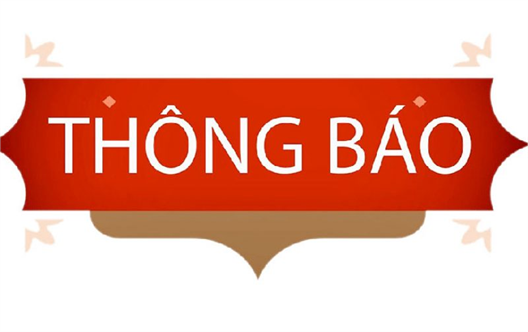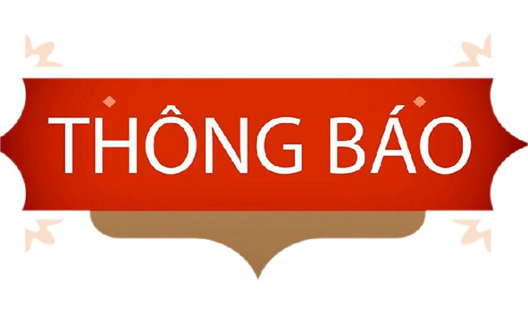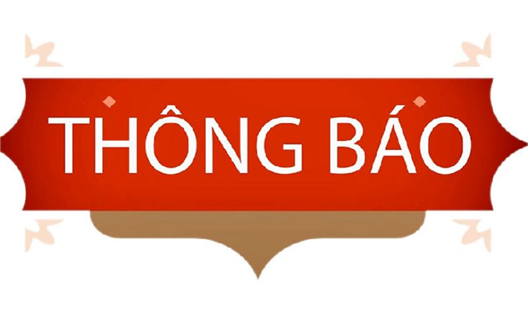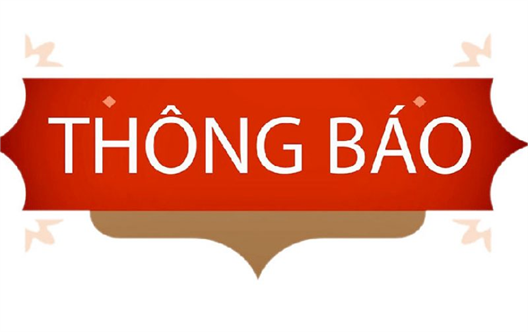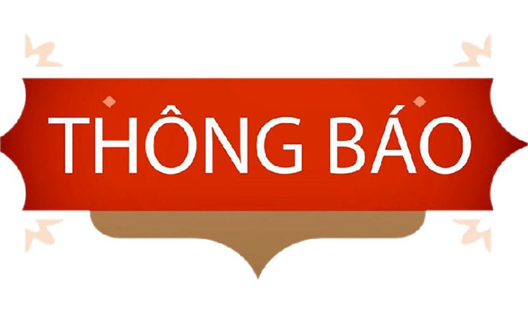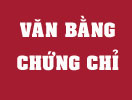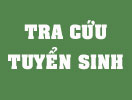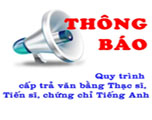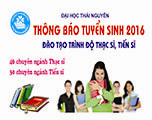Thông tin luận án
Ngày 24-04-2018
Thông tin luận án của NCS. Nguyễn Thị Thủy
TRANG THÔNG TIN KẾT QUẢ NGHIÊN CỨU
Tên đề tài luận án tiến sĩ: “Thực trạng và giải pháp nâng cao hoạt động khám chữa bệnh Y học cổ truyền tại một số trạm y tế xã miền núi Thái Nguyên”.
Chuyên ngành: Y tế công cộng.
Mã số: 9720701.
Họ và tên nghiên cứu sinh: Nguyễn Thị Thủy.
Người hướng dẫn khoa học:
Hướng dẫn 1:
PGS.TS Trịnh Xuân Tráng
Hướng dẫn 2:
![]()
Đơn vị đào tạo: Trường Đại học Y - Dược Thái Nguyên.
Cơ sở đào tạo: Đại học Thái Nguyên.
NHỮNG KẾT QUẢ MỚI CỦA ĐỀ TÀI
Đề tài đã mô tả được thực trạng hoạt động, một số yếu tố ảnh hưởng và hiệu quả giải pháp can thiệp đến hoạt động khám chữa bệnh bằng y học cổ truyền tại 4 trạm y tế xã huyện Đại Từ tỉnh Thái Nguyên:
1. Thực trạng hoạt động và một số yếu tố ảnh hưởng
- Nguồn nhân lực của tất cả các trạm y tế xã đều có đủ số về số lượng theo quy định nhưng trình độ chuyên môn còn hạn chế, đặc biệt là kiến thức, kỹ năng về châm cứu, thuốc Nam.
- Cơ sở vật chất phục vụ chẩn trị y học cổ truyền không đầy đủ, chưa có phòng chẩn trị YHCT riêng biệt, không có kinh phí dành riêng cho hoạt động y học cổ truyền, vườn thuốc Nam chưa có đủ số lượng cây thuốc theo quy định.
- Kiến thức về y học cổ truyền của người dân còn nhiều bất cập, tỷ lệ khám chữa bệnh bằng y học cổ truyền /tổng số khám chữa bệnh chung tại trạm y tế xã đạt song chủ yếu là sử dụng các chế phẩm y học cổ truyền.
- Công tác tuyên truyền của trạm y tế về việc sử dụng y học cổ truyền trong chăm sóc sức khỏe cho người dân chưa thực hiện được.
2. Hiệu quả giải pháp can thiệp
-Trang thiết bị tối thiểu để triển khai các hoạt động khám chữa bệnh bằng y học cổ truyền tại các trạm Y tế xã đã được cải thiện. Vườn thuốc Nam tại trạm y tế đã được xây dựng theo đúng quy chuẩn, đáp ứng công tác truyền thông tại trạm y tế.
- Kiến thức và kỹ năng về châm cứu, thuốc Nam, tư vấn thuốc Nam của nhóm cán bộ y học cổ truyền tại 2 xã can thiệp đều đạt mức tốt.
- Nhân viên y tế thôn bản biết tác dụng một số cây thuốc Nam để điều trị một số chứng bệnh thông thường, kỹ năng tư vấn thuốc Nam tốt đã tăng từ 0% lên 50% và 69,2%.
- Kiến thức, thực hành về cây thuốc của người dân đã tốt lên, tỷ lệ khám chữa bệnh bằng y học cổ truyền/ khám chữa bệnh chung tại trạm tăng trên 30%.
- Tỷ lệ khám chữa bệnh bằng y học cổ truyền/ khám chữa bệnh chung tại trạm tăng trên 30%, đặc biệt điều trị bằng châm cứu và thuốc Nam.
- Mô hình được cộng đồng chấp nhận và có tính bền vững.
CÁC ỨNG DỤNG, KHẢ NĂNG ỨNG DỤNG TRONG THỰC TIỄN, NHỮNG VẤN ĐỀ CÒN BỎ NGỎ CẦN TIẾP TỤC
NGHIÊN CỨU
* Các ứng dụng và khả năng ứng dụng: Mô hình can thiệp có thể nhân rộng sang các trạm y tế khác trên địa bàn nhằm đáp ứng nhu cầu chăm sóc sức khỏe nhân nhân bằng các phương pháp y học cổ truyền.
* Những vấn đề bỏ ngỏ cần tiếp tục nghiên cứu: Các hoạt động can thiệp của đề tài được đánh giá ngay sau thời gian can thiệp là 2 năm. Do vậy, đề tài chưa có điều kiện thu thập các chỉ số đánh giá về chất lượng dịch vụ, tác động và khả năng duy trì của mô hình can thiệp. Những vấn đề này cần được nghiên cứu tiếp trong thời gian tới để đánh giá được chính xác và đầy đủ hơn về mô hình để từ đó góp phần hoàn thiện và nhân rộng mô hình trong tương lai.
INFORMATION OF THE DOCTORAL DISSERTATION
- Title of the doctoral dissertation: “The factual situation and solutions to improve traditional medical examination and treatment activities at some mountainous communal health stations in Thai Nguyen province”
- Major: Public Health
- Code: 9720701
- Full name of Ph.D. candidate: Nguyen Thi Thuy
- Scientific supervisors:
Supervisor 1:
Assoc. Prof. Trinh Xuan Trang, Dr.
Supervisor 2:
![]()
- Training Unit: Thai Nguyen University of Medicine and Pharmacy
- Training Institution: Thai Nguyen University
THE NEW SCIENTIFIC FINDINGS
The research dissertation has described the actual situation of activities and a number of influencing factors and the effectiveness of interventions to traditional medical examination and treatment of 4 health stations in Dai Tu district, Thai Nguyen province:
1. The actual situation of activities and some influencing factors
- Human resources of all communal health stations are sufficient in quantity prescribed. However, professional qualification is limited, especially knowledge and skills on acupuncture and traditional medicine.
- Facilities for diagnosis and treatment by the method of traditional medicine are inadequate. Health stations have not separate rooms for traditional medical diagnosis and treatment, not separate fund for activities on traditional medicine. Medicinal Herb Gardens have not enough quantity of medicinal plants as prescribed.
- Knowledge about traditional medicine of the people is still shortcomings. The ratio of people examined and treated by the method of traditional medicine/total people examined and treated diseases at health stations is satisfied and preparations of traditional medicine are mainly used.
- Health stations have not been implemented the propaganda on the use of traditional medicine in health care for people.
2. The effectiveness of interventions
- The minimum equipment for deploying medical examination and treatment activities in health stations has been improved. Medicinal Herb Gardens of health stations have been built in accordance with standards and meeting communication work at health stations .
- Knowledge and skills on acupuncture, traditional medicine, traditional medicine counseling of traditional medicine staff groups in two intervention communes have assessed a good level.
- Village health workers know the effect of some medicinal herbs used for treating some common diseases. Good counseling skills of traditional medicine has increased from 0% to 50% and 69.2%.
- Knowledge and practice on medicinal herbs of residents have improved, ratio of people examined and treated by the method of traditional medicine/total people examined and treated diseases at health stations increased over 30%, especially treatment with acupuncture and traditional medicine.
- The model is accepted by community and sustainable.
PRACTICAL APPLICABILITY AND ISSUES NEEDING FOR FURTHER STUDIES
* Practical applicability
Intervention models can be applied to other health stations in the area in order to meet the health care needs of people with the method of traditional medicine.
* Issues needing for further studies
The intervention activities of the research project were evaluated immediately after a 2- year period of intervention.
Therefore, the research project has not been able to collect evaluation indicators of service quality, impact and sustainability of the intervention model. These issues need to be studied further in the coming time to evaluate more accurately and fully that can contribute to the fulfillment and replication of the model in the future.
Nguồn: Trường Đại học Y - Dược, Đại học Thái Nguyên
